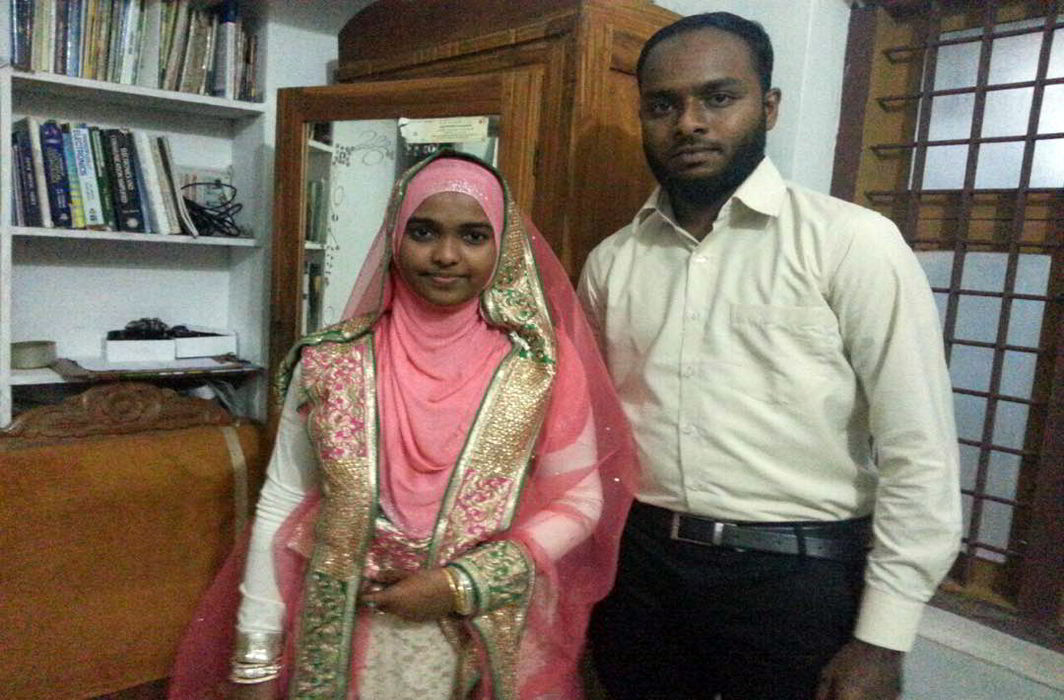Supreme Court expresses surprise over Asokan seeking his adult daughter’s custody, says consent is prime and no law prevents marriage with a criminal
The Supreme Court, on Monday (October 30), made it clear that any decision on the Kerala ‘love jihad’ case will only be taken after Hadiya alias Akhila – the Hindu girl who had married a Muslim man Shafin Jahan, a marriage that had been annulled by the Kerala High Court – had expressed her opinion in open court for which the time and date has been set for 3 pm on November 27.
The order of the apex court bench of Chief Justice Dipak Misra and Justices AM Khanwilkar and DY Chandrachud, is a modification of an earlier directive issued by the same court in which it had said that the statements of 24-year-old Hadiya before the SC will be recorded ‘in camera’.
The proceedings in what has come to be called the Kerala love jihad case, on Monday, saw high voltage arguments being put forth by senior advocates Shyam Divan and Kapil Sibal and Additional Solicitor General Maninder Singh – each of them trying hard to pursue their respective stands in the matter. The arguments were countered by equally pointed, often curt, observations by the apex court bench.
The proceedings on Monday began with the Chief Justice asking ASG Maninder Singh – who is appearing in the case on behalf of the National Investigation Agency (NIA) – on how Hadiya’s marriage with Shafin Jahan could be annulled in a Habeas Corpus petition.
Singh submitted that this is a case in which the girl has been indoctrinated and hence “court can invoke parental authority” though she is a major.
The Additional Solicitor General submitted that Akhila doesn’t want to be in the custody of her father, Asokan. A new application had been filed in the high court.
He said that as far as marriage is concerned “it is her personal consent. Who can say there is no free consent? I know my Lakshman Rekha and I am following the law. But the previous order passed by this court said the court has the authority to set the time of investigation. She married a criminal.”
The CJI asked: “Is there any law by which a girl can never fall in love with a criminal? I am really very surprised that her father wants custody of a major (she is now 25, was 24 when she married) person who is married to another major person.”
The ASG said: “We have to decide it within two or three hearings and the high court must know the fact that she does not want to be with her father.”
This is a critical part that the court would want to pay heed to. In a recent video made by social activist Rahul Eashwar in Kochi, Hadiya had said that her father was ill-treating her and that there was a threat to her life. She has been quoted as saying in the video: “You have to get me out. I am sure I will be killed tomorrow or the day after. My father is getting angry, I know. When I walk, he is pushing me and kicking me. If my head or any body part hits somewhere and I die…”
The bench said thereafter: “Unless we call the person we cannot decide if she can express herself or if she has given consent. Then we can take a call. Prima facie you have to satisfy our constitutional obligation of producing her in court.”
Senior advocate Shyam Divan, who is appearing on behalf of Haditya’s father Asokan, reiterated the call for constitutional obligation. “When you talk about unity and diversity we are not going by impulse of society, but we will go by the law,” he said.
Arguing that “there is an organizational apparatus” operating for getting inter-religious marriages between Hindu girls and Muslim men operating, Divan said that this apparatus “consists of PFI and such organisations… They have students, preachers, psychologists etc and they radicalize impressionable minds.The question is do courts respond to such radicalization or do they remain silent?”
Leveling serious allegations against Hadiya’s husband, Divan told the top court that Shafin Jahan also questioned the antecedents of Hadiya’s has contacts with a person who recruits people for global terror outfit Islamic State.
Divan went on to submit that “Kerala has a huge contingent of people who have joined ISIS,” a contention that evoked sharp objections from senior advocate Kapil Sibal, who is appearing for Hadiya’s husband.
Asserting that Divan’s allegations against his client were “false and baseless”, Sibal said: “He (Divan) is saying that entire Kerala has gone to ISIS…the antecedents of Shafin Jahan had been investigated by the Kerala Police.”
The CJI, after hearing the heated arguments, directed Hadiya’s father to produce her on the next date of hearing, set for November 27.


 India News20 hours ago
India News20 hours ago
 Latest world news20 hours ago
Latest world news20 hours ago
 Latest world news5 hours ago
Latest world news5 hours ago
 Latest world news5 hours ago
Latest world news5 hours ago
 India News5 hours ago
India News5 hours ago
 Latest world news5 hours ago
Latest world news5 hours ago
 India News5 hours ago
India News5 hours ago















